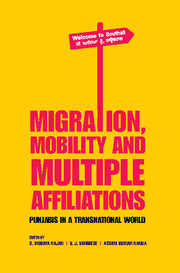Book contents
- Frontmatter
- Contents
- List of Tables and Figures
- Preface
- Acknowledgements
- Transnational World and Indian Punjab: Contemporary Issues
- Part I A Historical Survey
- Part II Shifting Contours of Migration
- 5 Ziddi Mundeh: Political Asylum, Transnational Movement and the Migrations of Men
- 6 Punjabi Illegal Migrants in France: Tales of Suffering, Invisibility and Marginalization
- 7 Migration as a Transnational Enterprise: Migrations from Eastern Punjab and the Question of Social Licitness
- Part III Social Structures and Organizational Links
- Part IV Education and Migration
- Part V Family Networks
- Contributors
- Index
7 - Migration as a Transnational Enterprise: Migrations from Eastern Punjab and the Question of Social Licitness
from Part II - Shifting Contours of Migration
Published online by Cambridge University Press: 05 March 2016
- Frontmatter
- Contents
- List of Tables and Figures
- Preface
- Acknowledgements
- Transnational World and Indian Punjab: Contemporary Issues
- Part I A Historical Survey
- Part II Shifting Contours of Migration
- 5 Ziddi Mundeh: Political Asylum, Transnational Movement and the Migrations of Men
- 6 Punjabi Illegal Migrants in France: Tales of Suffering, Invisibility and Marginalization
- 7 Migration as a Transnational Enterprise: Migrations from Eastern Punjab and the Question of Social Licitness
- Part III Social Structures and Organizational Links
- Part IV Education and Migration
- Part V Family Networks
- Contributors
- Index
Summary
Introduction
Globalization, as it is unfolding, sounds to be inherently ambivalent. The new regime of porosity of borders as represented by what is referred to as globalization is considered to be inversely related to human mobility across national borders. The modern political system as represented by mutually exclusive nation-states arguably retained considerable amount of fluidity towards ‘outsiders’ at least till 1970s, as the considerable unauthorized flows of people across the globe indicates. The advent of globalization, on the other hand, opened formal spaces for new and varied forms of integration, particularly through financial flows and trade, and was run down heavily with informal ways of human flows across nations. The ‘de-bordering’ of the developed world in particular has been coincided by a vigorous process of ‘re-bordering’, or the denationalizing of economic space alongside the renationalizing of politics as Sassen puts it, against transnational migrations puncturing the notion of ‘world in motion’ associated with globalization (Aas, 2007; Giorgi, 2010; Pickering and Weber, 2006; Sassen, 1996). The assorted forms and practices encompassing globalization while posing challenges to the very nation-state system, simultaneously allow the nation-states to tighten their grip over the borders due to pressures from within, based on ahistorical myths of homogenous and autonomous societies and fear psychosis of global terrorism. From the perspective of the sending countries with demographic dividend, emigrations are no more treated as a drain of brain and labour, but as a mechanism not only of gaining resources and skills but also facilitating high human development in the country of origin in the final analysis. The advocates of true liberalism in the question of migrations consider the ability to decide where to live as a key element of human freedom in an unequal world (UNDP, 2009). The poorest regions of the world would need more globalization rather than less as a levelling strategy (Bhagwati, 2004). The barriers to migration, particularly of those people with low skills, from this perspective considerably limit human choices and chances of even distribution of resources, but on the other hand contribute to a parallel economy of migration wherein informalities abound with enormous risk and severe tribulations.
- Type
- Chapter
- Information
- Migration, Mobility and Multiple AffiliationsPunjabis in a Transnational World, pp. 172 - 202Publisher: Cambridge University PressPrint publication year: 2015
- 2
- Cited by



